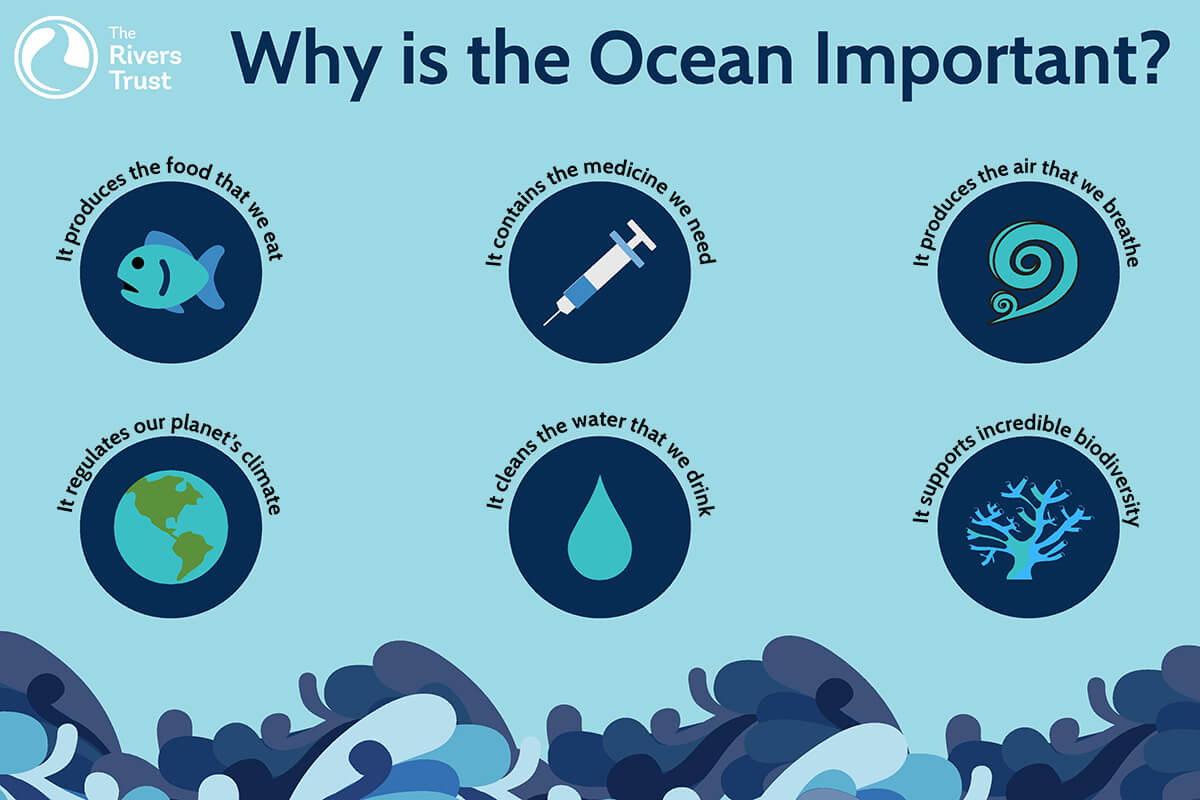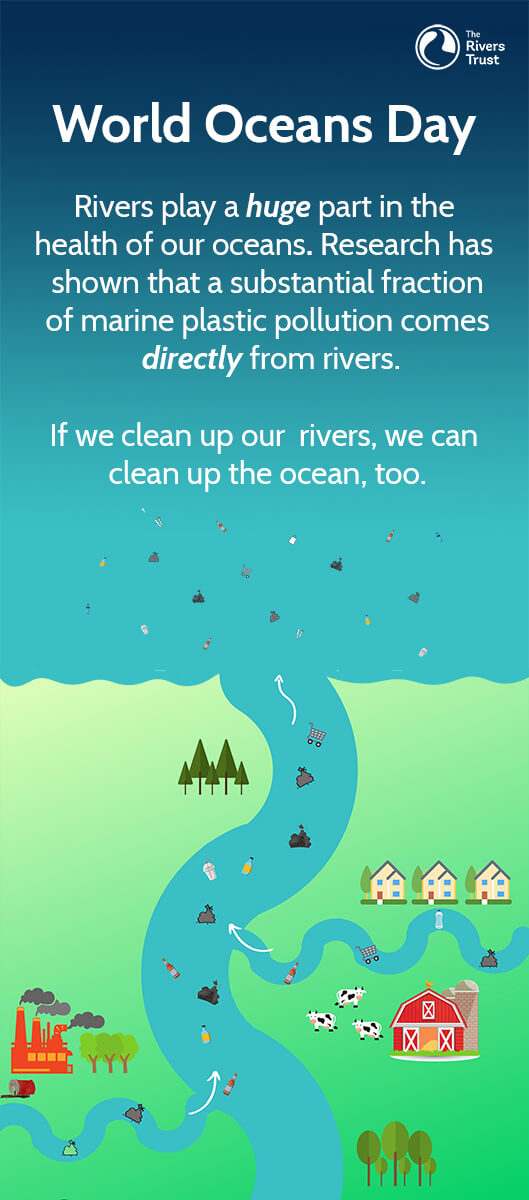World Oceans Day
Emily Cooper
08/06/19
Today is World Oceans Day!
Life as we know it relies on the ocean. It covers a whopping 71% of the Earth's surface—no wonder they call it the blue planet! Whether you notice it or not, the ocean plays a huge role in our lives; from the food that we eat to the air that we breathe, our way of life relies on the sea. We need to take action to protect the ocean's health.
There are a huge number of problems facing the ocean, ranging from acidification to coral bleaching—but one of the most insidious threats is pollution. In this way, the ocean's wellbeing is intrinsically linked to the status of our rivers. Many rivers feed directly into the sea; if these rivers are polluted, the ocean becomes polluted, too.
A recent study found that a "substantial fraction" of marine plastic originates from rivers. If we could clean up these rivers and prevent them from being contaminated, we could make a huge dent in ocean pollution. If you want to tackle marine pollution at its source, join the Rivers Trust movement!
 The Air We Breathe:
Over half of the oxygen we breathe is generated by marine life. Photosynthetic organisms such as phytoplankton and seaweed take in carbon dioxide and release oxygen. Thanks, guys! Couldn't do it without you.
The Food We Eat:
Roughly 16% of global protein is obtained from fish. The sustenance provided by the ocean is vitally important for global food security, which is why it's so important that fish stocks are properly managed and sustainable fishing methods are used.
The Medicine We Take:
The ocean contains a huge range of compounds which can be used to create new medicines. Ocean-derived drugs have been used in the treatment of cancer and alzheimers. Considering that we only know a fraction of the life which exists in the ocean, it's likely that it holds a huge amount of potential for treating other diseases, too.
Supporting Biodiversity:
The ocean is home to hundreds of thousands of different species—and its likely that thousands more have not yet been discovered. We strongly believe in the intrinsic value of biodiversity, but even if you don't, biodiversity provides society with a great deal of economic value, too!
Regulating Our Planet's Climate:
The ocean absorbs the majority of the sun's radiation, acting like a huge solar panel. This helps to regulate the temperature of the entire planet. This water can then evaporate, forming humidity, rain and storms - all vital components of the weather system. Finally, weather patterns can be driven by ocean currents. The ocean transports warm water from the equator towards the cooler poles and vice versa. This moderates the climate, reducing the extremity of temperatures in equatorial/polar regions.
The Air We Breathe:
Over half of the oxygen we breathe is generated by marine life. Photosynthetic organisms such as phytoplankton and seaweed take in carbon dioxide and release oxygen. Thanks, guys! Couldn't do it without you.
The Food We Eat:
Roughly 16% of global protein is obtained from fish. The sustenance provided by the ocean is vitally important for global food security, which is why it's so important that fish stocks are properly managed and sustainable fishing methods are used.
The Medicine We Take:
The ocean contains a huge range of compounds which can be used to create new medicines. Ocean-derived drugs have been used in the treatment of cancer and alzheimers. Considering that we only know a fraction of the life which exists in the ocean, it's likely that it holds a huge amount of potential for treating other diseases, too.
Supporting Biodiversity:
The ocean is home to hundreds of thousands of different species—and its likely that thousands more have not yet been discovered. We strongly believe in the intrinsic value of biodiversity, but even if you don't, biodiversity provides society with a great deal of economic value, too!
Regulating Our Planet's Climate:
The ocean absorbs the majority of the sun's radiation, acting like a huge solar panel. This helps to regulate the temperature of the entire planet. This water can then evaporate, forming humidity, rain and storms - all vital components of the weather system. Finally, weather patterns can be driven by ocean currents. The ocean transports warm water from the equator towards the cooler poles and vice versa. This moderates the climate, reducing the extremity of temperatures in equatorial/polar regions.

How Does The Ocean Help Us?
 The Air We Breathe:
Over half of the oxygen we breathe is generated by marine life. Photosynthetic organisms such as phytoplankton and seaweed take in carbon dioxide and release oxygen. Thanks, guys! Couldn't do it without you.
The Food We Eat:
Roughly 16% of global protein is obtained from fish. The sustenance provided by the ocean is vitally important for global food security, which is why it's so important that fish stocks are properly managed and sustainable fishing methods are used.
The Medicine We Take:
The ocean contains a huge range of compounds which can be used to create new medicines. Ocean-derived drugs have been used in the treatment of cancer and alzheimers. Considering that we only know a fraction of the life which exists in the ocean, it's likely that it holds a huge amount of potential for treating other diseases, too.
Supporting Biodiversity:
The ocean is home to hundreds of thousands of different species—and its likely that thousands more have not yet been discovered. We strongly believe in the intrinsic value of biodiversity, but even if you don't, biodiversity provides society with a great deal of economic value, too!
Regulating Our Planet's Climate:
The ocean absorbs the majority of the sun's radiation, acting like a huge solar panel. This helps to regulate the temperature of the entire planet. This water can then evaporate, forming humidity, rain and storms - all vital components of the weather system. Finally, weather patterns can be driven by ocean currents. The ocean transports warm water from the equator towards the cooler poles and vice versa. This moderates the climate, reducing the extremity of temperatures in equatorial/polar regions.
The Air We Breathe:
Over half of the oxygen we breathe is generated by marine life. Photosynthetic organisms such as phytoplankton and seaweed take in carbon dioxide and release oxygen. Thanks, guys! Couldn't do it without you.
The Food We Eat:
Roughly 16% of global protein is obtained from fish. The sustenance provided by the ocean is vitally important for global food security, which is why it's so important that fish stocks are properly managed and sustainable fishing methods are used.
The Medicine We Take:
The ocean contains a huge range of compounds which can be used to create new medicines. Ocean-derived drugs have been used in the treatment of cancer and alzheimers. Considering that we only know a fraction of the life which exists in the ocean, it's likely that it holds a huge amount of potential for treating other diseases, too.
Supporting Biodiversity:
The ocean is home to hundreds of thousands of different species—and its likely that thousands more have not yet been discovered. We strongly believe in the intrinsic value of biodiversity, but even if you don't, biodiversity provides society with a great deal of economic value, too!
Regulating Our Planet's Climate:
The ocean absorbs the majority of the sun's radiation, acting like a huge solar panel. This helps to regulate the temperature of the entire planet. This water can then evaporate, forming humidity, rain and storms - all vital components of the weather system. Finally, weather patterns can be driven by ocean currents. The ocean transports warm water from the equator towards the cooler poles and vice versa. This moderates the climate, reducing the extremity of temperatures in equatorial/polar regions.
Want to Tackle Pollution at its Source?
By cleaning up rivers, we can help to reduce the amount of river-borne plastic which enters the ocean. Let's fight plastic pollution at its source; find your nearest volunteer event today! You could make a real difference in the future of the ocean.